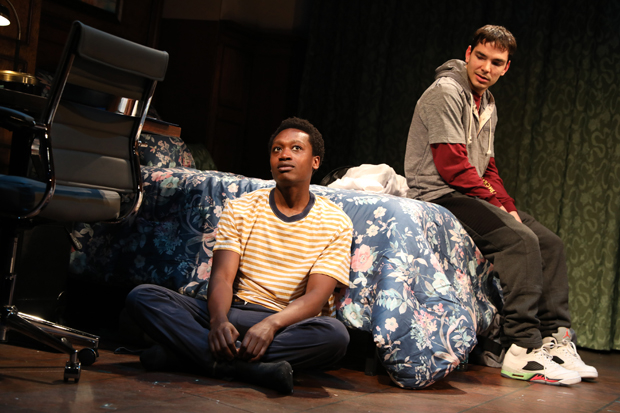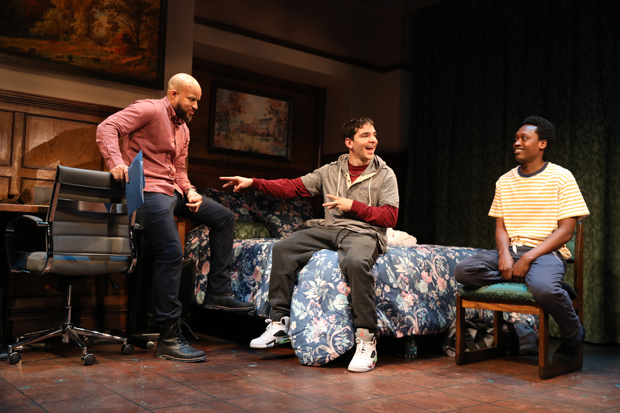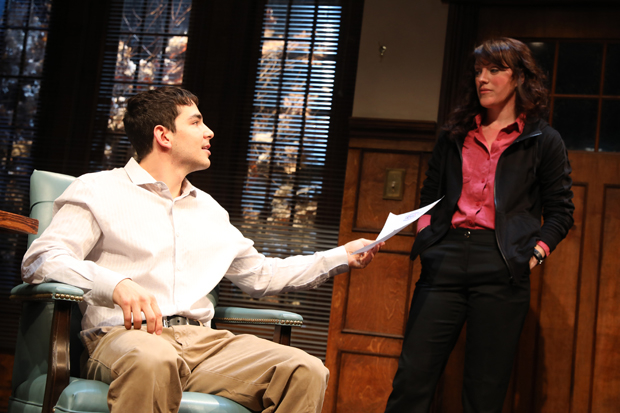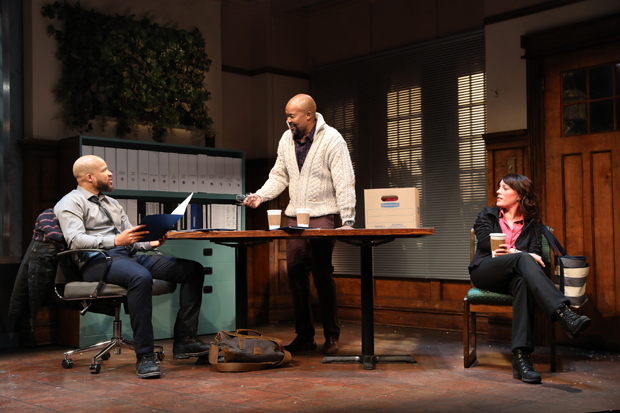Transfers Examines Who Gets Ahead and Who Gets Left Behind in Higher Education

(© Joan Marcus)
"War. Famine. Torture. Fascist regimes. Inequality among the sexes. Brutality," says a character in Lucy Thurber's Transfers, rattling off a daunting list of ills before prescribing the remedy: "The cure for all these things is education." But is it really? Several excellent new plays, including Dominique Morisseau's Pipeline and Joshua Harmon's Admissions, question the very premise of education as a tool for social equality, especially as it is practiced in the United States. Add Transfers to the mix. Thurber's best play to date, it exposes the singular cruelty of declaring the value of a good education while simultaneously denying it to one's fellow citizens.
Thurber has been writing about the forgotten corners of America since long before the election of Donald Trump made that a fashionable thing to do. Her previous work, a five-play cycle called The Hill Town Plays, was about working-class white people in western Massachusetts. Transfers also takes place there, but in the hallowed halls of Herrell University, an elite liberal arts college with a scholarship program that allows a handful of poor students of color to pass through its ivied gates.

(© Joan Marcus)
Two of the candidates are Clarence Matthews (Ato Blankson-Wood) and Cristofer Rodriguez (Juan Castano), both currently students at Danvers Community College. They grew up in the same impoverished Bronx neighborhood, but the heavy air between them suggests an uneasy history. Could this be the tension of rivalry? David DeSantos (Glenn Davis), an employee of the NGO that coordinates the scholarship, assures them that they're not even in competition for the same slot since Cristofer is a wrestler going for an athletic scholarship, while Clarence's scholarship would be purely academic. Still, both candidates have to go through an interview, and David wants to help them prepare, guiding them through the protocols and pitfalls of Herrell like a Sherpa on the summit of American privilege.
By the time we get to those interviews, we're so invested in the characters that their success or failure feels personal. Thurber has written very specific characters that are made all the more real by emotionally committed performances. Blankson-Wood is a quietly confident Clarence: Black, gay, and smart, he knows how to fade into the background, holding all of his emotions under the surface until they spew out like a geyser. Temperamentally, he is the opposite of Cristofer, whom Castano embodies with unconcealed nervous energy. We get the sense that he is the kind of wrestler who can go round after round without ever tiring, but is regularly baited into avoidable leg sweeps.

(© Joan Marcus)
When she learns during his interview that Cristofer was the No. 2 wrestler in New York State, Coach Rosie McNulty (Samantha Soule) pointedly asks, "Why weren't you first?" Hailing from small-town Maine and the only white character in the play, Rosie is a refugee from the expanded Lucy Thurber universe. Soule plays her with a protean grin that shifts from warm to mocking and back again without notice, adding to Cristofer's discomfort. Clarence's interviewer is the much cuddlier Geoffrey Dean (a smiling, grandfatherly Leon Addison Brown). He's a seasoned academic whose embrace of feel-good cliché betrays a lifetime in the ivory tower. As the passionate and exasperated David, Davis is not only an advocate for our two protagonists, but an avatar for our feelings. Like him, we know that Cristofer and Clarence can escape the cycle of poverty if they are only given a chance.
Director Jackson Gay reels us in and riles us up with a taut, well-designed production. Jessica Ford costumes our two protagonists in oversize Kmart clothing for the first scene, instantly revealing their economic means while making the actors seem younger than they are. The wood paneling and wallpaper of Donyale Werle's set easily transforms from a motel to a variety of university spaces. Werle and lighting designer Russell H. Champa emphasize the difference between the inside and outside parts of this set: The inside glows with warm incandescence, while the outside languishes in cold winter gloom (a gentle snowfall around the central playing space adds to this effect). It's a heavy-handed metaphor, but the point is clear: It is better to be in than out.

(© Joan Marcus)
By striking at the moving target of the intersection of race and class, Thurber conveys a shrewd understanding of who from the outside is allowed to come in. She forces us to ask: If we really believe that a quality education is the key to social harmony, why is it afforded to so few? Better than any play from this season, Transfers heartbreakingly exposes the unequal distribution of opportunity that we tell ourselves is based on merit. It isn't, and Thurber knows it. By the end of Transfers, so does everyone in the audience.










